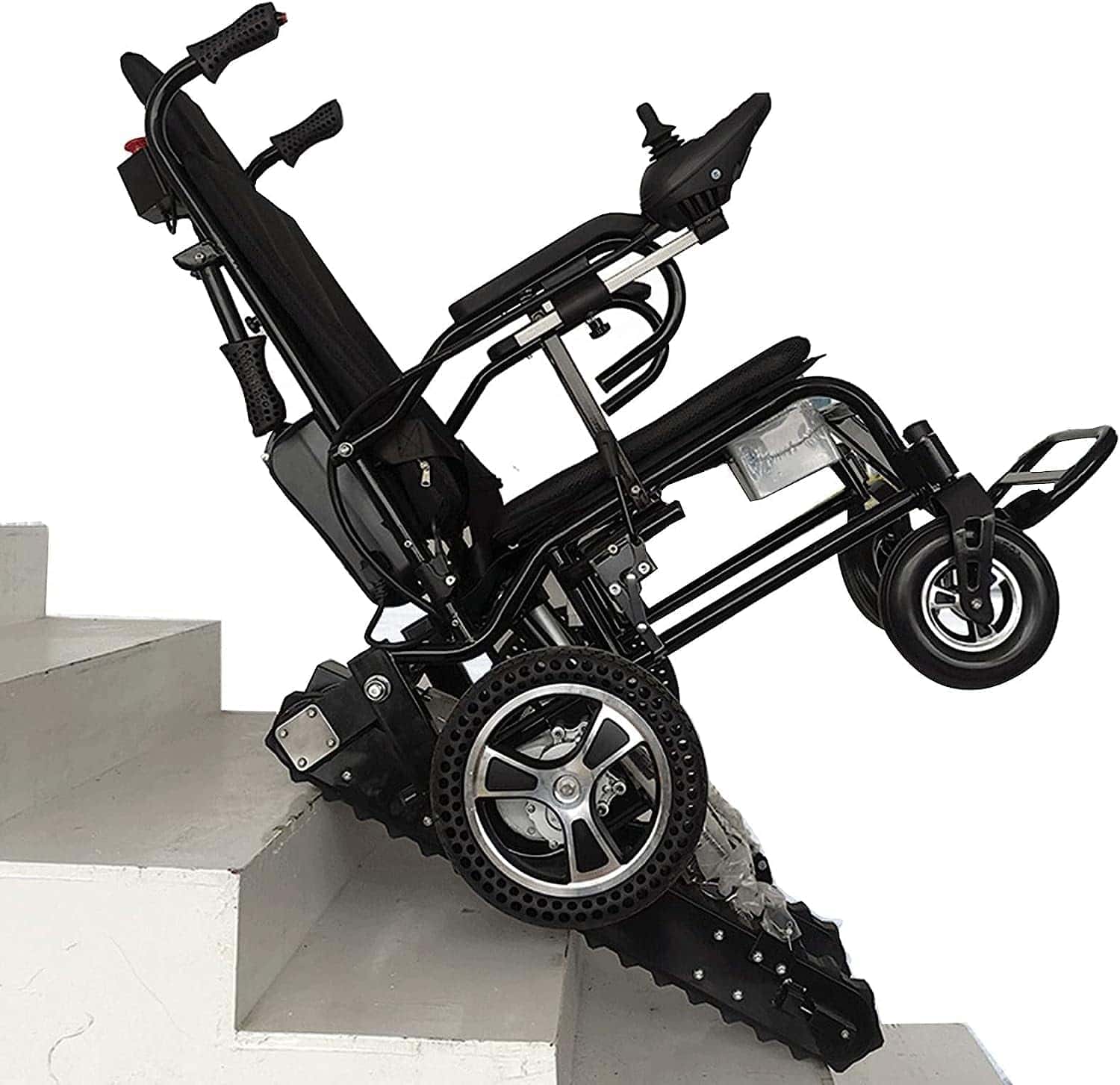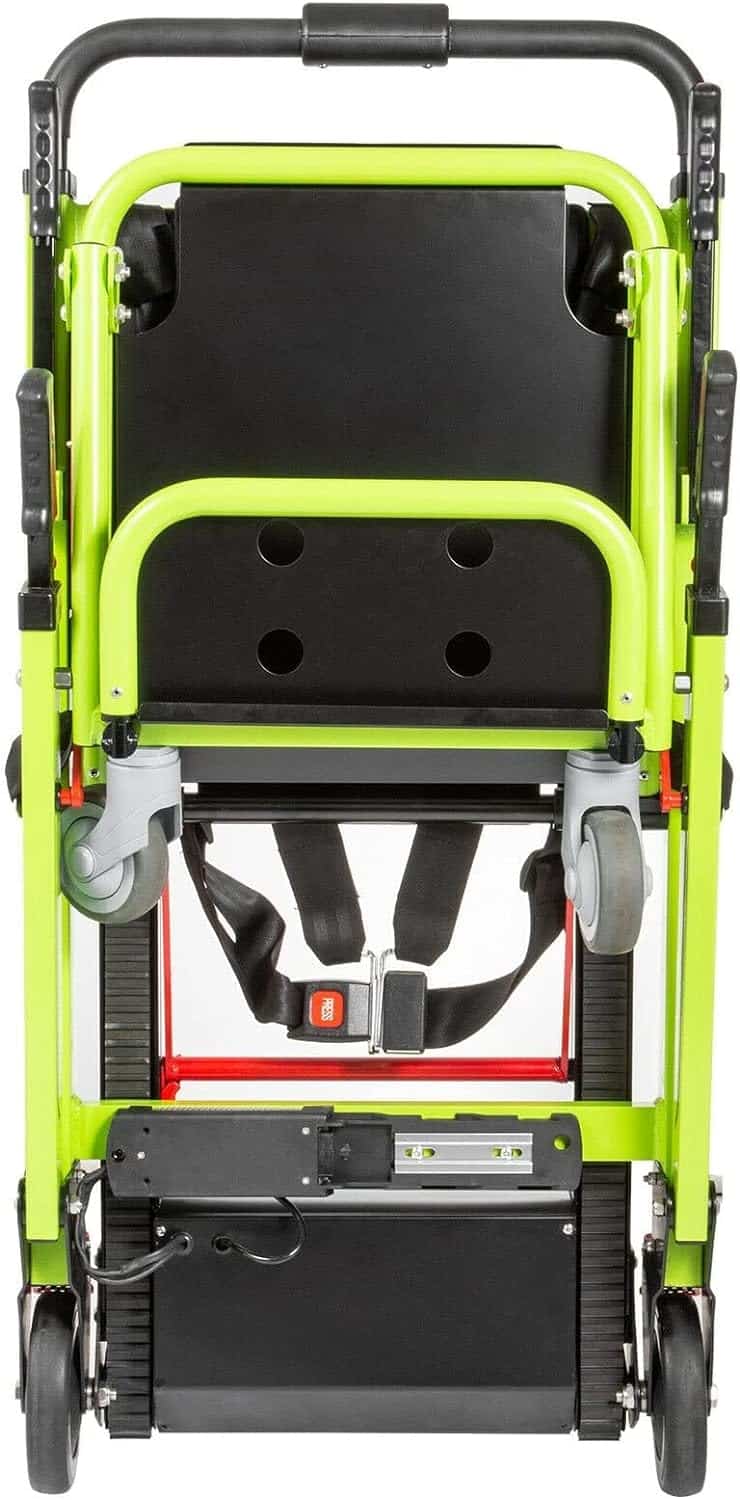Wheelchairs for stairs are made specifically to help people with mobility issues. Numerous individuals can use these cutting-edge devices, including those with physical limitations, the elderly, and people recovering from surgery or an injury.
These wheelchairs the sometimes challenging obstacle of climbing the stairs, allowing users to move independently and confidently through their homes.
Our in-depth analysis of the best stair-climbing wheelchairs on the market reveals how these products can significantly improve a person’s quality of life. These wheelchairs are simple to manoeuvre up and down stairs, giving users more freedom and mobility.
A more independent way of life for the user is encouraged, largely reducing the need for expensive home modifications or reliance on carers.
We evaluated stair-climbing wheelchairs which offer useful and ergonomic designs for the best possible user comfort. They also provide cutting-edge safety features like emergency stop buttons, and rubber anti-slip tracks to ensure a firm grip on stairs.
Due to the wheelchairs’ sturdy construction and ability to support heavy loads, they are ideal for many users. Considering these crucial elements in our thorough review, we will support you in making an informed decision on the best stair-climbing wheelchair for you.




















Manual wheelchairs require physical strength or a helper, making them less suitable for people with limited upper body strength or without a carer. However, it is important to note that they are typically more affordable and more straightforward to maintain.
Both manual and electric stair-climbing wheelchairs work to help people with limited mobility in navigating the stairs. Using a simple joystick or control panel, you can control the wheelchair. Consequently, this provides independence and reduces stress.
On the other hand, electric wheelchairs use mechanical engineering to climb stairs. Consequently, this eliminates the need for physical exertion from the user or carer. They also offer an automatic brake system for safety, whilst quickly negotiating varying stair configurations.
Whilst these electric wheelchairs are a reliable option for the user, they are typically more expensive than manual wheelchairs and need frequent charging. However, it is important to recognise that they also provide an excellent solution for emergency evacuation. This is because they can quickly and safely navigate stairs.
The overall width of both types of wheelchairs can also vary, with some models designed to be compact for narrow staircases or corridors. Although both wheelchairs can be fitted with various seats for comfort, it is worth noting that electric wheelchairs frequently offer more customisation options.
In contrast to traditional wheelchairs, stair climbers can quickly ascend and descend stairs. This type of mobility aid utilises a set of wheels or tracks that grip the edge of each step, consequently allowing the user to move up or down the staircase.
Stair climbers can handle different types of staircases, ranging from straight stairlifts to those with curves or turns. Since they are typically electrically powered, they require less physical effort from the user or carer. This makes them an excellent option for people with conditions, such as spinal cord injuries, that may limit their strength.
For navigating stairs in any situation, a stair climber wheelchair offers a dependable option. This is due to their sturdy construction and safety features, such as anti-slip tracks and emergency stop buttons. In addition, some stair climbers are designed to serve as evacuation chairs. Therefore, this provides a safe and effective means of emergency evacuation for disabled people.
However, you should note that stair climbers aren’t just for stairs. Rather, like a traditional wheelchair, many models can also handle flat ground. This adaptability makes them a sensible option for people looking for all-encompassing mobility solutions.
Before making your purchase, it is necessary to consider the type of stairs that the wheelchair will need to navigate. Whilst some models are made for straight stairlifts, others can handle curved or spiral staircases. The overall width of the wheelchair is also essential, especially if the user needs to manoeuvre through narrow hallways or doorways.
Furthermore, the wheelchair’s ability to climb stairs should be taken into consideration. This is because some models are better suited to climbing steep stairs, whereas others are better suited to shallow steps. Therefore, look for wheelchairs with anti-slip tracks or wheels, automatic brakes, and emergency stop buttons.
Another important factor to recognise is comfort. To ensure the user can sit comfortably for extended periods, it is important to look for wheelchairs with adjustable seats and armrests. You should also think about the wheelchair’s weight capacity, ensuring that it can support the user safely.
In order to guarantee longevity and performance, all wheelchairs need to be periodically cleaned and serviced. In addition, electric wheelchairs need to be charged regularly.
Many homes have bathrooms on different floors, making it difficult for those with limited mobility to navigate the stairs. However, wheelchairs for stairs can safely transport the user up and down the stairs, consequently lowering the risk of falls and injuries.
This could be particularly helpful in homes with split-level design, where there may be one or two steps between rooms. Moreover, some models of stair-climbing wheelchairs are even designed to navigate tram tracks. This provides an even greater range of mobility.
Additionally, using a stair climber wheelchair can lessen the need for pricey home modifications, such as wheelchair lifts or stair lifts. This is because they allow users to navigate their homes independently, boosting confidence and reducing dependency on carers.
Although stair-climbing wheelchairs can increase bathroom safety, it’s essential to remember that they are not a perfect solution for everyone. Therefore, they should replace of grab bars, non-slip mats and proper lighting.
UK Care Guide is really proud to have been featured on some of the UK’s leading websites.

















Jane is one of our primary content writers and specialises in elder care. She has a degree in English language and literature from Manchester University and has been writing and reviewing products for a number of years.
Have a free consultation with an Acorn Stairlift specialist.
0333 567 1612
|
Same day appointments | Next day installation available
